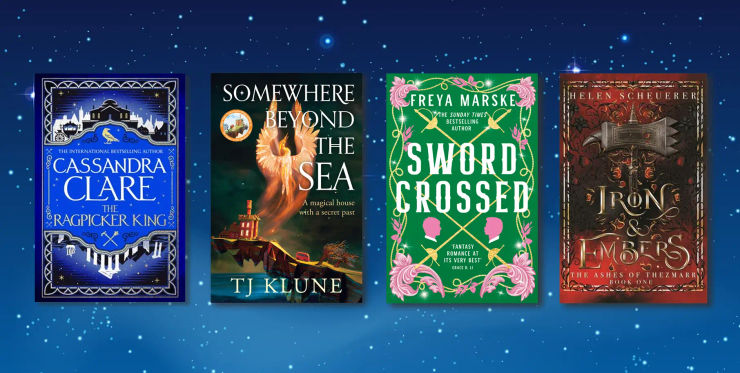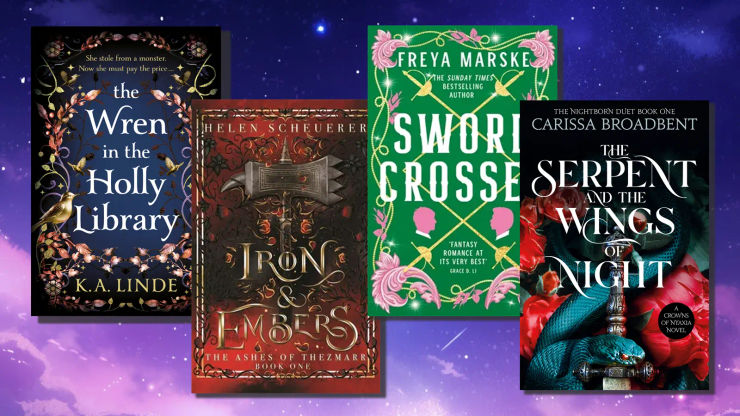Top Tips for Getting Published
Calling all aspiring writers! Take a look at our guide to getting your science fiction and fantasy novel published.

Last June I was asked to provide my top tips for aspiring authors for a blog post over at One Chapter More. With the New Year not far behind us, many of you may have new year's resolutions to write a novel so I thought I'd re-post this post, in case it is useful:
One of the perks of working for Tor is reading the ‘slush pile’. Many well-known authors have found success after having been discovered on the slush pile, including a few of our own long-term authors. We are one of the few major publishers in the UK to accept direct submissions. When you consider how much work there is involved in publishing, how many agented scripts are submitted and how few hours there are in the day – you can understand why!
However, in January of last year, we decided to open our doors to the SFF community; there’s plenty of talent out there and we know that many of them would still find it preferable to be published traditionally than go down the self-publishing route. And we got a LOT of submissions – we’re still continuing to work through them. As there are only three of us and we all work full-time on the list, it’s a matter of trying to grab some reading time in that tenuous fantasy-like thing ‘free time’, but we’re trying!
One thing we have found though, is that despite the wealth of information available about how to write a novel and get published, there are still a few steps some aspiring writers fall down on. For this reason, I’m going to share my all-time top ten tips for getting your novel published.

- Think about your pitch letter. I’ve seen many submissions where an author has either sent in no pitch letter, or just a long summary of the novel’s plot. Your pitch letter is like your covering letter: whether you are sending to agents or publishers, the pitch letter is often the first thing the agent or editor sees, so it’s important you make it as snappy and relevant as possible. If you can, try to sum-up your novel in a one sentence pitch, and always keep your personal biography brief. And always, always proofread your letter. If your pitch letter is riddled with typos, we’ll presume the same lack of thought has been put into the novel.
- Make sure you’ve done your research into who to send your novel to and ensure that it’s an agent/publisher relevant to the area you’re writing in.
- Read the guidelines. You’d be surprised how many submissions I’ve seen that are half the required length and about a woman ‘finding love’ in Manhattan. If there isn’t at least a whiff of the supernatural /dystopian/ghostly/future/fantastical or anything in between, then we aren’t the publisher for you.
- Do your research. Read widely in the genre you are writing in. If you have penned a fantasy, make sure you look at the different types of fantasy out there and read around it. This is important because it will teach you about the basics of world building, which fantasy tropes you should avoid, and it will help you with the next point…
- Know your comparison authors: I’ve read many emails where authors compare their novel to The Lord of the Rings or say it is ‘just like China Miéville’. Very often, the novel is nothing like these novels or authors. If you read widely and get to know your target market, you will have a better understanding of who to compare your novel to.
- Create a fully-believable world. Understanding how to create a fully-believable world is probably one of the most problematic areas for new genre writers. Often when reading new authors or submissions, the characterisation, dialogue and plot is very good, but there’s barely any world-building. This is about more than just describing the character’s surroundings; it’s about creating a fully-realised world that is distinct from the world around us. Without knowing our protagonist’s playground and understanding the building blocks that make up that society or world, it’s very difficult to build up tension or understand the ramifications of a character’s actions in that society.
- Give your main character something to want. Whether that’s an escape from their over-bearing family, a romantic relationship with a werewolf, or to overthrow the government, without your central character wanting something right from the beginning of the story, your protagonist will be flat and passive. The best stories are where the characters create their own destinies rather than have their destinies forced upon them.
- Editorial notes to first-time authors usually have a lot of comments such as ‘show, don’t tell’. This, along with ‘avoid repetition, overwriting and convenient story lines – increase pace’ are pretty key to any debut author. Avoid huge swathes of dialogue with the characters ‘telling’ the reader what’s happening in the scene rather than perhaps just cutting it down to a couple of lines of description that shows the reader what’s happening. Also avoid having sixteen pages of writing about a character examining a flower (no matter how beautiful the writing, we need pace!) Try not to be too convenient with plot lines, and don’t feed the reader the story – let them discover it themselves.
- Get a beta reader. Or preferably several, who aren’t in your close circle of family and friends and who are likely to offer you honest advice. I’ve seen many submissions talking about how the author’s husband or friends all think their novel is great – of course they do, they’re not going to suggest otherwise, but they are probably not the most objective readers. Even if that feedback is hard to hear at first, you will value it further down the line when you realise your novel is much better because of making those changes. Then in turn – be your own harshest critic, self-edit!
- Don’t give up hope. We all have different tastes and are looking for different things in a writer. What works for one editor may not work for everyone and vice versa. Sometimes the best writers are those that are rejected many times. And if you don’t get anywhere with your first novel, take heed of any advice you are given and go away and revise or write something new. A lot of established authors still have their first novel festering under the bed!


